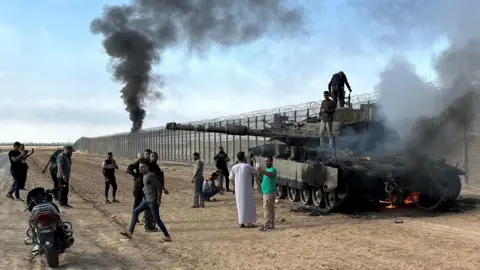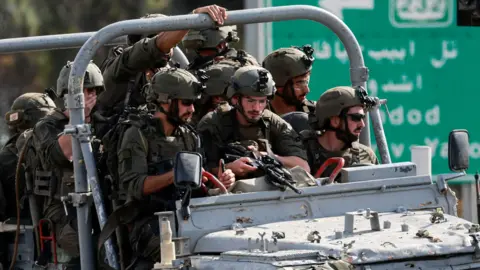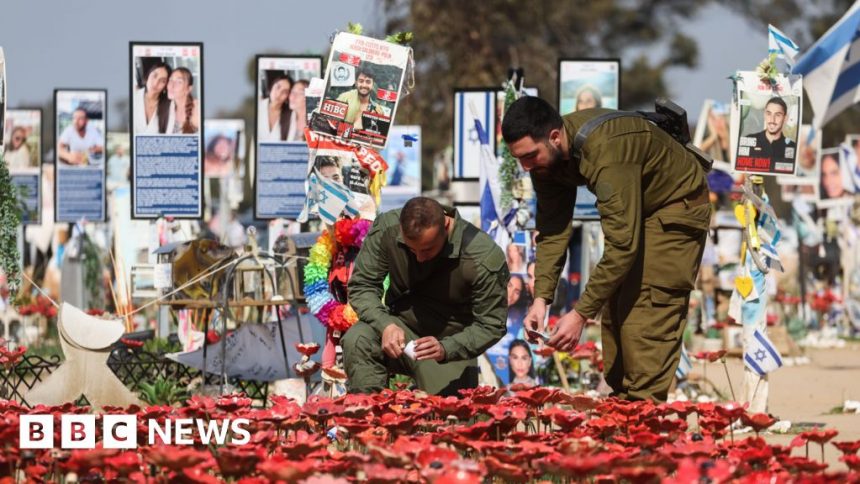Israel’s military publishes first report on 7 October 2023 failures
 EPA
EPAIsrael’s military has published its first official account of the mistakes that led to its failures during Hamas’s 7 October 2023 attack, which triggered the Gaza war.
The report concludes that the Israel Defence Forces (IDF) “failed in its mission to protect Israeli civilians”.
The 19-page report contains much that is already known about what led to catastrophic loss of about 1,200 lives when approximately 5,000 gunmen from Hamas and other Palestinian groups stormed into Israel, also taking 251 hostages in the process.
There are no dramatic revelations, but it is still sobering to see the military’s conclusions about how it misjudged Hamas’s intentions and underestimated its capabilities laid out in black and white.
The report says the military regarded Gaza as a secondary security threat, with priority given to Iran and Hezbollah. Its policy towards Gaza, it says, was “paradoxical: Hamas was illegitimate, yet there was no effort to develop an alternative”.
The military had chosen a “conflict management” approach to dealing with Gaza, it says. And had assumed that Hamas was “neither interested [in] nor preparing for a large-scale war” – a perception reinforced by Hamas’s own deception tactics.
Evidence from 2018 onwards suggesting that Hamas – which is proscribed as a terrorist group by Israel, the US, UK and other countries – was indeed developing an ambitious plan was interpreted as “unrealistic or unfeasible”, reflecting “Hamas’s long-term aspirations rather than an actionable threat”.
The report says that in the months leading up to the war, the Military Intelligence Directorate began to develop a new assessment, suggesting that Hamas’ plan was not merely a vision but “a concrete framework for operational planning”.
However, this emerging assessment was not brought to the attention of senior officials in military intelligence.
 Reuters
ReutersThe report identifies a broad streak of complacency within the military about Hamas’s intentions and how to deal with the threat it posed.
“There was no deep discussion of the question: What if we are wrong?” the report says.
Over time, “a significant and continuous gap between the intelligence assessments of Hamas and reality” had developed.
The report also highlights what it says was “a decline in deep familiarity with the enemy’s different worldview, including its culture, religion, language and history”.
It calls for deep reform of the intelligence directorate’s culture, “fostering intellectual openness, scepticism, listening, learning, debate, and constructive disagreement”.
It says the desire to protect highly valuable intelligence sources contributed to the military’s failure to raise the alert level immediately before 7 October.
The Gaza Division, it says, “was effectively defeated for several hours” on 7 October, significantly impairing its ability to understand what was going on and respond effectively.
It says the Air Force responded quickly, but that “there was significant difficulty distinguishing between IDF troops, civilians and terrorists”.
The report also says that in some incidents, wounded soldiers were evacuated before civilians.
 Reuters
ReutersAfter presenting the findings to commanders on Monday, the IDF’s outgoing chief of staff, Lt Gen Herzi Halevi, said he took full responsibility for the failures.
“I embrace my responsibility. It is mine. I was the commander of the army on 7 October and I have my responsibility and I have all of your responsibility. I see that as mine too. And I see that in every command of mine that went wrong, there is also a part of me,” he said in a video.
Last month, the general announced his resignation over the failures and called for a commission of inquiry to carry out a broader investigation that would help prevent another attack.
Israeli Prime Minister Benjamin Netanyahu, who has not acknowledged any responsibility for what happened on 7 October, has said such a state inquiry should wait until the end of the war.
His critics accuse Mr Netanyahu of being unwilling to admit any personal fault.
Israel responded to the 7 October attack by launching an air and ground campaign in Gaza, during which at least 48,365 people have been killed, according to the territory’s Hamas-run health ministry.








